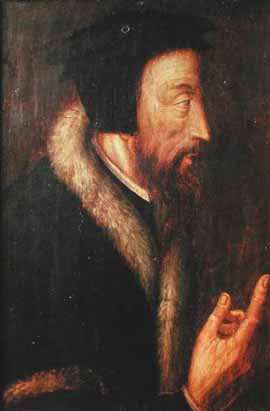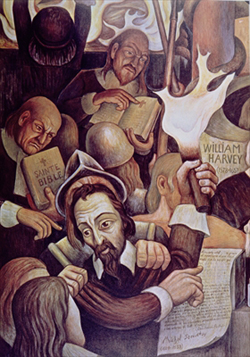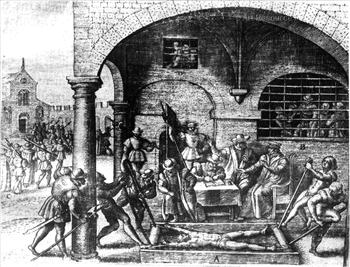 |
Faith under Attack
Calvin, the Tyrant of Geneva
Fr. Leonel Franca, S.J.
Calvin was as proud as Luther. At age 26, without any serious theological formation, he published his Institutes of the Christian Religion in which he pretended to explain all the doctrine necessary for salvation. In it he set out his thinking on the most elevated and intricate questions of dogma and morals to orient his action as impromptu reformer.
According to this young man, the whole Magisterium of the Roman Church – including all her Popes – had erred completely on the interpretation of the Gospel. Only he, during his three years of hasty private studies, understood the genuine meaning of the truths that the entire world had missed. He is the bright beacon that shines alone in the universal darkness…

The pseudo-Reformer of Geneva allowed no word spoken against him or his doctrine |
Writing about the satisfaction, or reparation, demanded for sins committed, he stated: “Regarding satisfaction, I am little moved by the numerous passages in the writing of the fathers relating to satisfaction. I see many of them – frankly almost all the books that have come down to us – went astray of the truth in this matter.”(1)
Woe to those who would dare to disagree with the young doctor! He would call his adversaries offensive names: fools, crazy, frenetic, sophists, drunk, mad, sacrilegious, sycophants, wild beasts, atheists and swine, among other epithets.
Jean Jacques Rousseau describes him: “Who was ever more caustic, imperious, strong-willed and more divinely infallible, according to his own opinion, than Calvin? For him the least opposition, the least objection that someone dared to present was always considered a work of Satan, a crime deserving to be punished by fire.”(2)
When fellow pseudo-reformer John Eckius, who disagreed with him on various points, got sick in Geneva, Calvin wrote this about him: “One says that Eckius will recover: The world still does not deserve to be delivered of this wild beast.”(3) Is this the language of charity appropriate for one who pretended to be the restorer of evangelical Christianity?
Calvin, whose political influence grew enormously in Geneva from 1546 to 1564, imposed severe penalties on those who would return to Catholicism, not attend his sermons or speak a word against his doctrines or his person. Even Protestant authors, such as J.B. Galiffé, acknowledge the despotism of Calvin:
“For years people were obliged to report in minute detail every word spoken against him and the doctrine of predestination, with which he identified himself to such a degree that to speak against the dogma became as dangerous as to speak against him. The poor were dragged to prisons, scourged, reviled, obliged to walk in the streets barefoot wearing a penitential habit and carrying a torch to expiate for what Calvin arbitrarily called blasphemies.”(4)
For having disagreed with him on some points of doctrine, Sebastian Castillo, rector of a boys school in Geneva and an old friend of Calvin, was fired from his position and expelled from the city. For accusing the Calvinist doctrine of being absurd, Jérôme-Hermès Bolsec was sent to prison for weeks and then banished from Geneva.

Miguel Servet, condemned to burn for disagreeing with Calvin |
For criticizing Calvin at a banquet, Pierre Ameaux, a city official, was forced to make expiation by parading through the city squares in a hair-shirt and begging God for forgiveness. These are the words of the official sentence:
“He is condemned to go around the city in penitential clothing, bareheaded, carrying a torch in his hand. When arriving before the tribunal, he must kneel, confess having evilly and maliciously spoken vile words, and manifest his repentance; then, he must beg for mercy before God and the justice of man. He is condemned to pay all the expenses. This sentence should be publically announced.”(5)
Others were still more unfortunate and had to pay with their lives for the crime of opposing the tyrant of Geneva. For having accused Calvin of being a heretic, Jacques Gruet was tortured and beheaded in 1547. Spanish physician Miguel Servet was sent to the flames for having censured the opinions of the master; he asked for a lawyer but this right was denied to him. Italian Valentino Gentile was condemned to a similar penalty but was forgiven after he humbly repented. Later, however, he was beheaded in Berne by the Swiss Protestants there.
It is horrifying to review the many criminal processes in Geneva during the autocratic reign of “this tyrant priest who submitted Geneva to the most infamous servitude,” Galiffé continues.(6) He reports that the number of judgments by public tribunals normally made in one year in the city “was easily surpassed in a single month or even a week under the rule of Calvin. Often there were many of these spectacles in a single day.”(7) Further on, he affirms that “two years of Calvin’s government produced 414 criminal processes. … There were hundreds of processes of this kind in that epoch, which some dare to call the most beautiful of our history.”(8)

Calvinist atrocities, 16th century woodgraving |
Multiple death sentences are also reported by this same Protestant scholar, Galiffé, who delved into the records of that time. Describing a short period of Calvin’s rule he says, “One counts 30 executions of men and 28 of women, subdivided by method of death: 13 persons hanged, 10 beheaded, 55 quartered, 35 burned alive after being tortured.”(9)
Reporting the religious persecutions of Calvin, author Jean Tet affirms that “from 1542 to 1546, which was the softer period of his government, we count 58 capital executions, 76 banishments and 900 imprisonments.”(10)
In the blindness of his pride, the head of Swiss Protestantism issued the most extravagant moralizing prohibitions. He forbade sweets to be served at wedding banquets.(11) He forbade all kinds of amusement – especially gambling, singing and dances – as inventions of the Devil.(12) His despotism reached the point of forbidding people to drink from a mountain spring that was famous for healing the fever under the pretext that it was a form of idolatry. There were en masse denunciations of persons who were interrogated, placed under arrest and punished because they were healed in that manner.(13)
Notwithstanding this “moralization,” Galiffé concludes, never before did immorality take hold and spread as it did in the period of Calvin’s government.(14)
1. Calvin, Institutes of the Christian Religion, tran. by Henry Beverage (Hendrickson Publishers, 2008), Book Third, chap. IV, n. 38; Opera, vol. 2, p. 489.
2. Jean Jacques Rousseau, Lettres de la Montagne (Amsterdam, 1764), vol. 1, p. 103.
3. Opera, vol. 11, p. 217.
4. J.B. Galiffe, Notices genealogiques sur les familles genévoises, (Genève: 1836), vol. 3, p. 545.
5. J.B. Galiffe, Nouvelles pages d’histoire exacte, 1863, p. 60.
6. J.B. Galiffe, Notices genealogiques sur les familles genévoises, vol. 3, p. 538.
7. J.B. Galiffe, Nouvelles pages d’histoire exact, pp. 105-106.
8. J.B. Galiffe, Notices genealogiques sur les familles genévoises, vol. 3, p. 544.
9. J.B. Galiffe, Nouvelles pages d’histoire exact, p. 100.
10. Jean Tet, Histoire de la persecutions religieuse à Genève (Paris: Lecoffre, 1879), p. 473.
11. Calvin à Genève, art. 141.
12. J.B. Galiffe, Notices genealogiques sur les familles genévoises, vol. 3, p. 381.
13. Ibid, vol. 3, p. 528.
14. J.B. Galiffe, Nouvelles pages d’histoire exact, pp. 95-98.

Summarized and translated by the TIA desk from Leonel Franca,
A Igreja, a Reforma e a Civilização,
Rio: Livraria Catholica, 1928, pp. 201-205.
Posted May 16, 2011

Related Topics of Interest
 Vatican Paper Defends Calvinism Vatican Paper Defends Calvinism
 The Lutheran and Calvinist Mentalities The Lutheran and Calvinist Mentalities
 Luther’s Lack of Credibility Luther’s Lack of Credibility
 Luther’s Boundless Pride & Tyranny Luther’s Boundless Pride & Tyranny
 Luther the Libertine Luther the Libertine
 Luther’s Appalling Instabilities & Contradictions Luther’s Appalling Instabilities & Contradictions
 Luther Thought He Was Divine! Luther Thought He Was Divine!
 Luther: No, Absolutely No! Luther: No, Absolutely No!

Related Works of Interest
|
Faith under Attack | Religious | Home | Books | CDs | Search | Contact Us | Donate

© 2002-
Tradition in Action, Inc. All Rights Reserved
|
 |
|